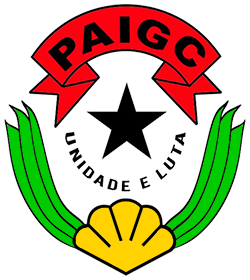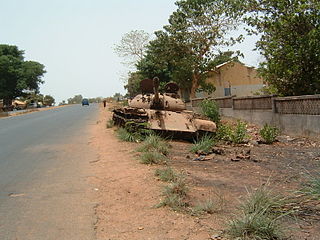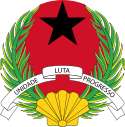Guinea-Bissau was dominated by Portugal from the 1450s to the 1970s; since independence, the country has been primarily controlled by a single-party system.

Politics of Guinea-Bissau takes place in a framework of a semi-presidential representative democratic republic in transition, whereby the President is head of state and the Prime Minister is head of government, and of a multi-party system. Executive power is exercised by the government. Legislative power is vested in both the government and the National People's Assembly.
This name uses Portuguese naming customs: the first or maternal family name is Artur and the second or paternal family name is Sanhá.

Parliamentary elections were held in Guinea-Bissau on 28 March 2004 after repeated postponements caused by political and financial chaos in the country, including a coup d'état that overthrew President Kumba Ialá in September 2003. The former ruling party, the African Party for the Independence of Guinea and Cape Verde (PAIGC), won the largest number of seats, but did not obtain a majority. Former President Yala's party, the Party for Social Renewal (PRS), came second with 35 seats.

The African Party for the Independence of Guinea and Cape Verde is a political party in Guinea-Bissau. Originally formed to peacefully campaign for independence from Portugal, the party turned to armed conflict in the 1960s and was one of the belligerents in the Guinea-Bissau War of Independence. Towards the end of the war, the party established a Marxist–Leninist one-party state, which remained intact until multi-party democracy was introduced in the early 1990s. Although the party won the first multi-party elections in 1994, it was removed from power in the 1999–2000 elections. However, it returned to office after winning parliamentary elections in 2004 and presidential elections in 2005, since which it has remained the largest party in the National People's Assembly.

João Bernardo "Nino" Vieira was the President of Guinea-Bissau from 1980 to 1984, for the second time from 1984 to 1999, and for the third time from 2005 to 2009. After seizing power in 1980, Vieira ruled for 19 years, and he won a multiparty presidential election in 1994. He was ousted at the end of the 1998–1999 civil war and went into exile. He made a political comeback in 2005, winning that year's presidential election. Vieira was killed by soldiers on 2 March 2009, apparently in retaliation for a bomb blast that killed Guinea-Bissau's military chief General Batista Tagme Na Waie. The military officially denied these allegations after Army officials claimed responsibility for Vieira's death.

The Guinea-Bissau Civil War was fought from 7 June 1998 to 10 May 1999 and was triggered by an attempted coup d'état against the government of President João Bernardo Vieira led by Brigadier-General Ansumane Mané. Government forces, backed by neighbouring states, clashed with the coup leaders who had quickly gained almost total control over the country's armed forces.

The African Party of Independence of Cape Verde is a former socialist party and currently a social-democratic political party in Cape Verde. Its members are nicknamed "os tambarinas" in Portuguese, and they identify themselves with the color yellow.

Elections in Guinea-Bissau take place within the framework of a multi-party democracy and a semi-presidential system. Both the President and the National People's Assembly are directly elected by voters.

Presidential elections were held in Guinea-Bissau on 19 June 2005, with a second round runoff on 24 July. The elections marked the end of a transition to democratic rule after the previously elected government was overthrown in a September 2003 military coup led by General Veríssimo Correia Seabra. The result was a victory for former President and independent candidate João Bernardo Vieira.

This name uses Portuguese naming customs. the first or maternal family name is Bacai and the second or paternal family name is Sanhá.
The United Social Democratic Party (PUSD) is a centre-left social democratic political party in Guinea-Bissau.
This name uses Portuguese naming customs. the first or maternal family name is José and the second or paternal family name is Fadul.
Ansumane Mané was a Bissau-Guinean soldier who led a 1998 uprising against the government of President João Bernardo Vieira, which caused a brief, but bloody civil war.

Parliamentary elections were held in Guinea-Bissau on 16 November 2008. The result was a victory for the African Party for the Independence of Guinea and Cape Verde (PAIGC), which won 67 out of the 100 seats in the National People's Assembly, while the Party for Social Renewal (PRS) won 28 seats.

Presidential elections were held in Guinea-Bissau on 28 June 2009 following the assassination of President João Bernardo Vieira on 2 March 2009. As no candidate won a majority in the first round, a second round was held on 26 July 2009 between the two leading candidates, Malam Bacai Sanhá of the governing African Party for the Independence of Guinea and Cape Verde (PAIGC) and opposition leader Kumba Ialá. Sanhá won with a substantial majority in the second round, according to official results.

General elections were held in Guinea-Bissau on 3 July 1994, with a second round for the presidential election on 7 August. They were the first multi-party elections since independence, and also the first time the president had been directly elected, as previously the post had been elected by the National People's Assembly. In the presidential election, the result was a victory for incumbent João Bernardo Vieira of the African Party for the Independence of Guinea and Cape Verde (PAIGC), who defeated Kumba Ialá of Social Renewal Party in the second round. In the Assembly election, 1,136 candidates ran for the 100 seats, of which the PAIGC won 62.

General elections were held in Guinea-Bissau on 13 April 2014, with a second round for the presidential elections held on 18 May since no candidate received a majority in the first round. Several logistic problems and delays caused the elections to be repeatedly postponed, having initially been scheduled for 24 November 2013 and then 16 March 2014. In the second round, José Mário Vaz of the African Party for the Independence of Guinea and Cape Verde was declared the president-elect with 62% of the vote.









